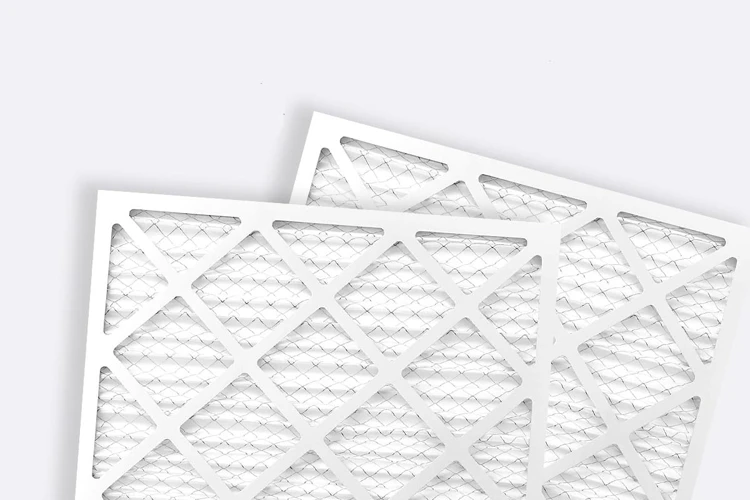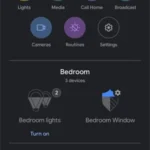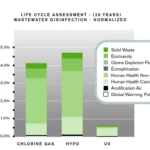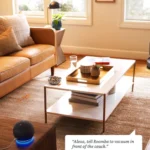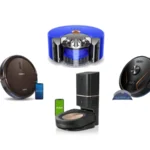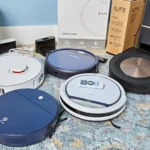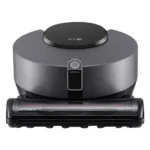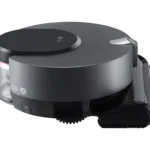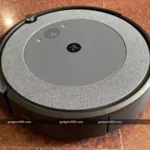Have you ever wondered if the air inside your home or office is truly clean? With so many products on the market claiming to purify the air, it’s easy to get lost and confused in a sea of information. One of the most popular and effective methods of air filtration is HEPA filtration, but what exactly is it and how does it work? In this article, we will debunk common myths surrounding HEPA filtration and separate fact from fiction. So sit back and take a deep breath as we dive into the world of HEPA filtration.
What is HEPA filtration?
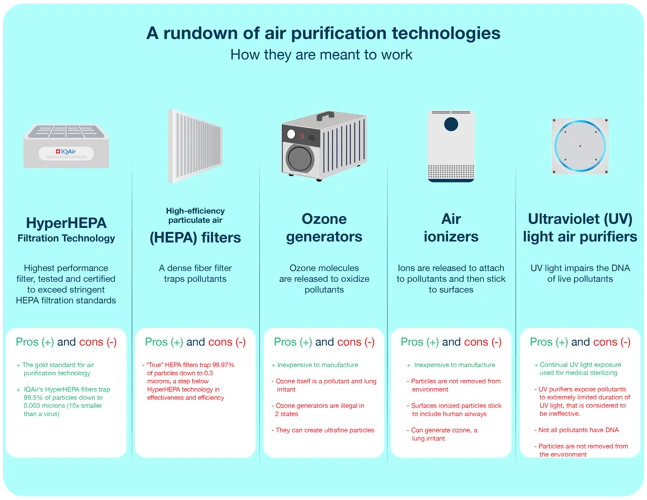
If you’re looking for an effective air filtration system, HEPA filtration is one of the most popular options available. But what is HEPA filtration, exactly? HEPA stands for High-Efficiency Particulate Air, and it refers to a type of filter capable of trapping tiny particles in the air. It’s commonly used in air purifiers, vacuums, and other home appliances to promote better indoor air quality. In this section, we’ll take a closer look at how HEPA filtration works and what it can do. If you want to learn more about HEPA filtration and its benefits, take a look at our HEPA Filtration for Home Air Quality guide.
How Does HEPA Filtration Work?
HEPA filtration works by using a dense filter made up of a mat of randomly arranged fibers, typically made from fiberglass. The fibers create a maze-like structure that air is forced through, trapping any particles that are larger than the spaces between the fibers. This includes tiny irritants like pollen, dust, and smoke.
- The filter: The media filter used in the HEPA filtration system is the star of the show. It’s a mat of randomly arranged fiberglass fibers that trap pollutants as air passes through them.
- The mechanism: The filter uses three mechanisms – interception, impaction, and diffusion – to trap particles of different sizes. The larger particles are trapped through impaction, where they collide with a fiber and get stuck. The smaller particles follow a tortuous path of the fibers, which trap them through interception. Diffusion is used for the tiniest particles and involves the particles being bounced around by gas molecules until they collide with a fiber and are caught.
- HEPA vs. standard filtration: Unlike standard filters, which might only capture some pollutants, HEPA filters remove 99.97% of airborne contaminants that are 0.3 microns or larger.
If you’re concerned about the effectiveness of your HEPA filtration system, it’s essential to maintain it properly. This includes regular replacement of the filter and cleaning of the system. Check out our article on smart vacuum HEPA filter maintenance for more information.
What Can HEPA Filtration Remove?
HEPA Filtration is a highly effective method of capturing small airborne particles, including dust, pollen, pet dander, and even bacteria and viruses. HEPA Filters can remove up to 99.97% of particles that are as small as 0.3 microns from the air. This makes it an ideal choice for people who suffer from allergies, asthma, or other respiratory conditions.
Here is a list of some of the things that HEPA Filtration can remove:
- Pollen
- Dust mites
- Smoke particles
- Pet dander and hair
- Mold spores
- Bacteria and viruses
- Certain types of asbestos
HEPA Filtration is so effective at capturing small particles that it is often used in hospitals and laboratories to create sterile environments. Additionally, HEPA Filtration is environmentally friendly because it does not release any harmful byproducts and can reduce the amount of waste created by other air purification methods.
If you are interested in learning more about the benefits of HEPA Filtration, check out our article on Smart HEPA Vacuum Cleaners or our comparison of HEPA Filtration vs. Standard Filtration. For those who have pets, you may be interested in reading about HEPA Filtration for Smart Vacuums for Pet Owners or for those suffering from allergies, check out our article on HEPA Filtration for Smart Vacuums for Allergies.
How Effective is HEPA Filtration?
HEPA filtration is highly effective in removing airborne particles that are as small as 0.3 microns. This type of filter can capture a wide range of particles such as pollen, dust mites, pet dander, and even bacteria and viruses. However, it’s important to note that not all HEPA filters are created equal. Some filters may not meet the high standards required to be classified as a true HEPA filter. That’s why it’s important to look for filters that are labeled as “True HEPA” or “HEPA Certified”.
So, how effective is HEPA filtration at removing airborne particles?
Here are some key points to consider:
- HEPA filters can capture up to 99.97% of airborne particles. This means that for every 10,000 particles that pass through the filter, only three particles will make it through.
- HEPA filtration is effective in reducing indoor air pollution. According to the Environmental Protection Agency (EPA), indoor air can be up to 5 times more polluted than outdoor air. HEPA filters can help to reduce the levels of pollutants in your indoor air, which can have a positive impact on your health and well-being.
- HEPA filtration is particularly effective for people with allergies or respiratory issues. By removing allergens and irritants from the air, HEPA filters can help to relieve symptoms such as sneezing, coughing, and wheezing.
- HEPA filtration can be used in a variety of settings. HEPA filters are commonly used in air purifiers, vacuum cleaners, and HVAC systems. They can also be used in hospitals and other healthcare settings to help prevent the spread of airborne diseases.
HEPA filtration is a highly effective way to improve the air quality in your home or workplace. Make sure to choose a high-quality filter that meets the standards for a true HEPA filter and maintain it properly for maximum effectiveness. If you’re interested in learning more about HEPA filtration in vacuum cleaners, check out our article on smart vacuum cleaners with HEPA filters. Additionally, choosing HEPA filters can be an environmentally friendly choice, as they can reduce the need for chemical air fresheners and reduce the amount of pollutants released into the environment.
Common Myths About HEPA Filtration

As with any technology or solution, HEPA filtration has sparked some misconceptions over the years. These myths, while widely believed, can be detrimental to the overall understanding and implementation of HEPA filtration. It’s important to separate fact from fiction in order to fully comprehend how this technology can benefit us. Let’s debunk some common myths regarding HEPA filtration.
Myth: HEPA Filters Can Remove 100% of Airborne Particles
Myth: HEPA Filters Can Remove 100% of Airborne Particles
One of the most common myths about HEPA filtration is that it can remove 100% of airborne particles. This is simply not true. While HEPA filters are incredibly effective at capturing a wide range of airborne particles and pollutants, including dust, pollen, pet dander, and even some viruses, they cannot capture all particles.
HEPA filters are designed to capture particles as small as 0.3 microns in diameter, which includes many common allergens and pollutants. However, some particles, such as volatile organic compounds (VOCs) and gases like carbon monoxide, are much smaller and cannot be captured by a HEPA filter alone.
It’s important to note that even though HEPA filters cannot capture 100% of airborne particles, they are still very effective at improving indoor air quality. HEPA filtration can remove a significant amount of pollutants from the air, which can benefit individuals with allergies, asthma, or other respiratory conditions.
Some examples of particles that HEPA filters can capture include:
- Dust mites
- Pollen
- Pet dander
- Mold spores
- Bacteria
- Some viruses
While HEPA filtration is effective, it should not be the only strategy for improving indoor air quality. Other strategies, such as regular cleaning, reducing sources of pollution, and proper ventilation, should also be considered to create a healthy indoor environment.
It’s also important to note that not all HEPA filters are created equal. HEPA filters must meet specific quality standards, which are set by organizations such as the United States Department of Energy (DOE) and the European Committee for Standardization (CEN). Consumers should look for HEPA filters that meet these standards to ensure that they are getting a high-quality filter that will effectively remove pollutants from the air.
While HEPA filters are highly effective at capturing a wide range of airborne particles and are an important tool for improving indoor air quality, they cannot remove 100% of particles. Consumers should be aware of this myth and use HEPA filtration in combination with other strategies to create a healthy indoor environment.
Myth: HEPA Filters are All the Same
Myth: HEPA filters are all the same.
This is a common misconception about HEPA filters that can be easily debunked. All HEPA filters are not the same, and there are different types of HEPA filters available on the market. For instance, some HEPA filters come with activated carbon, while others don’t. Similarly, some HEPA filters are designed for use in homes, while others are meant to be used in industries.
There is also a difference in the quality of HEPA filters. HEPA filters have a MERV (Minimum Efficiency Reporting Value) rating that ranges from 1 to 20. The higher the MERV rating, the better the filter. A filter with a higher MERV rating can trap smaller particles effectively. However, a higher MERV rating also means more resistance to the air passages, which could affect the performance of the filter.
Different HEPA filters are designed to be used with different products. For instance, a HEPA filter that is compatible with one vacuum cleaner might not be ideal for another vacuum cleaner. It is essential to check the specifications of the HEPA filter and see if it is the right fit for your device.
To sum it up, HEPA filters are not all the same, and it is crucial to choose the right filter for your device. HEPA filter quality and compatibility should be considered before making a purchase. Always check the MERV rating and product specifications before buying a HEPA filter.
If you’re interested in learning more about HEPA filtration in vacuums, check out our article on HEPA Filtration in Smart Vacuums: Is It Worth the Investment?.
Myth: HEPA Filters Don’t Need to be Replaced
Myth: HEPA Filters Don’t Need to be Replaced.
One of the most common misconceptions about HEPA filters is that they do not need to be replaced. Some people even believe that once they purchase a HEPA filter, they can use it indefinitely without any need for maintenance or replacement. However, this is entirely untrue.
HEPA filters, like any other filter, have a limited lifespan and will eventually become clogged with the particles they capture. The frequency with which they need to be replaced will depend on several factors, including the air quality in your area and how often the filter is used.
To help you understand the importance of regular HEPA filter replacement, let’s take a closer look at some of the details of HEPA filter maintenance:
| Myth: | HEPA filters never need to be replaced |
|---|---|
| Reality: | HEPA filters have a limited lifespan and must be replaced periodically |
| Frequency: | The frequency of filter replacement will depend on the air quality in your area and how often the filter is used |
| Consequences: | If HEPA filters are not replaced regularly, their efficiency will decrease, and they may even release captured particles back into the air |
When a HEPA filter becomes clogged with particles, its efficiency decreases, and it may even release captured particles back into the air, negating the filter’s purpose. This can be harmful to individuals who suffer from allergies or respiratory issues.
It’s essential to follow the manufacturer’s recommendations for filter replacement, which is typically every six to twelve months, depending on usage. Some HEPA filters have indicators that will alert you when it’s time to replace them.
HEPA filters are not a one-time investment, and they require periodic replacement. Neglecting to replace them regularly can result in decreased efficiency and potential health risks. So, it’s vital to follow the manufacturer’s recommendations for maintenance and replacement to ensure optimum performance and clean air in your home or office.
Myth: HEPA Filters are a One-Time Investment
Myth: HEPA Filters are a One-Time Investment
One of the biggest misconceptions about HEPA filters is that they are a one-time investment. Unfortunately, this is not the case. While HEPA filters can last for a long time, they will eventually need to be replaced.
The lifespan of a HEPA filter depends on several factors, such as the quality of the filter and the amount of particulate matter it is exposed to. Most manufacturers recommend replacing HEPA filters every 6-12 months to ensure that they continue to function effectively.
To illustrate the importance of replacing HEPA filters, let’s take a look at a hypothetical scenario. Imagine that you have a HEPA filter installed in your home, and you haven’t replaced it in several years. Over time, the filter will become clogged with dirt, dust, and other particulate matter. As a result, the filter’s efficiency will decrease, and it will no longer be able to effectively capture airborne particles.
To maximize the lifespan of your HEPA filter, it’s important to perform regular maintenance, such as cleaning the filter and changing it according to the manufacturer’s recommendations.
It’s also important to note that not all HEPA filters are created equal. Some manufacturers may advertise their filters as “lifetime” or “permanent,” but this is often misleading. While these filters may last longer than traditional filters, they will still need to be replaced eventually.
In fact, some manufacturers of these “lifetime” filters may actually void your warranty if you attempt to clean or reuse the filter. It’s important to choose a reputable manufacturer and follow their guidelines for filter replacement.
While HEPA filters can be a wise investment for improving indoor air quality, they are not a one-time investment. To ensure that your HEPA filter continues to function effectively, it’s important to regularly replace it according to the manufacturer’s recommendations.
| Myth: | HEPA Filters are a One-Time Investment |
|---|---|
| Truth: | HEPA filters will eventually need to be replaced, usually every 6-12 months according to the manufacturer’s recommendations. |
| Importance of Maintenance: | To maximize the lifespan of your HEPA filter and ensure that it continues to function effectively, it’s important to perform regular cleaning and replacement. |
| Beware of Misleading Claims: | Some manufacturers may advertise their filters as “lifetime” or “permanent,” but these claims are often misleading and may void your warranty if you attempt to clean or reuse the filter. |
The Truth About HEPA Filtration
As the demand for cleaner and safer indoor air continues to increase, many people turn to HEPA filtration technology for their air purification needs. However, with so many brands and models claiming to be HEPA filters, it can be difficult to discern which products are truly effective. In this section, we will separate fact from fiction and uncover the truth about HEPA filtration. From the effectiveness of HEPA filters to the standards that determine their quality, we will explore everything you need to know about HEPA filtration technology. So, let’s dive in and discover the truth about HEPA filtration.
The Effectiveness of HEPA Filtration
HEPA filtration is widely recognized as one of the most effective ways to improve indoor air quality. It can remove harmful airborne particles, such as pollen, dust, and pet dander, ensuring that the air we breathe is clean and healthy. But how effective is HEPA filtration, really?
HEPA Filtration Effectiveness
To understand the effectiveness of HEPA filtration, it’s important to know that HEPA filters are designed to remove particles based on their size. According to industry standards, a true HEPA filter must remove at least 99.97% of airborne particles that are larger than 0.3 microns in diameter.
Particle Size
Common indoor pollutants, such as dust and pollen, typically range in size from 1 to 100 microns. Bacteria and viruses, on the other hand, can be as small as 0.01 microns. While HEPA filters cannot remove particles that are smaller than 0.3 microns, they are still effective at capturing a sizable portion of harmful particles.
HEPA Filter Efficiency
In fact, many studies have shown that high-quality HEPA filters can capture over 99.9% of all indoor airborne particles, including those smaller than 0.3 microns. The efficiency of a HEPA filter can depend on several factors, including the quality of the filter itself, the airflow rate, and the size and type of particles being captured. By choosing a high-quality HEPA filter and ensuring proper maintenance and replacement schedules, you can continue to enjoy the benefits of clean indoor air.
| Particle Size | Percent of particles captured* |
|---|---|
| 0.01-0.1 microns | Over 99.9% |
| 0.1-1 microns | Over 99.9% |
| 1-10 microns | Over 99.9% |
| 10-100 microns | Over 99.9% |
*Percentages based on high-quality HEPA filters with proper maintenance and replacement schedules.
HEPA filtration is an incredibly effective way to improve indoor air quality and protect against harmful airborne particles. By understanding how HEPA filters work and choosing high-quality filters with proper maintenance, you can enjoy the benefits of clean, healthy air in your home or office.
HEPA Filter Quality and Standards
HEPA filters have become increasingly popular due to their ability to remove small particles from the air. However, not all HEPA filters are created equal. It’s important to understand the different levels of HEPA filter quality and standards.
HEPA Filter Quality
The quality of a HEPA filter can vary based on the materials used and the manufacturer’s design. Some HEPA filters are made with thinner fibers, resulting in lower efficiency rates. Higher quality HEPA filters are made with thicker fibers and stronger filter media, increasing their ability to remove particles from the air.
There are four main types of HEPA filters based on their quality and efficiency rates. These include:
| Type of HEPA Filter | Efficiency Rate |
|---|---|
| Basic HEPA Filter | 99.97% |
| True HEPA Filter | 99.97% |
| Medical Grade HEPA Filter | 99.99% |
| ULPA Filter | 99.999% |
As you can see, the efficiency rate increases with the quality of the HEPA filter, with ULPA filters being the most effective.
HEPA Filter Standards
In addition to quality, HEPA filters are also held to certain standards to ensure their effectiveness. The two main standards for HEPA filters are the European Norm (EN) and the United States Military Standard (MIL-STD).
The EN standard measures a filter’s efficiency based on the number of particles per cubic meter of air. HEPA filters must have an efficiency rate of 99.95% or higher to meet the EN standard.
The MIL-STD measures a filter’s effectiveness based on the number of particles it can remove in a single pass. To meet the MIL-STD standard, a HEPA filter must have an efficiency rate of 99.97% or higher.
It’s important to look for HEPA filters that meet both the EN and MIL-STD standards to ensure their effectiveness.
Not all HEPA filters are created equal. It’s important to understand the different levels of HEPA filter quality and standards to ensure you are getting an effective filter for your needs. Look for filters that meet both the EN and MIL-STD standards and consider investing in a higher quality filter.
HEPA Filter Maintenance
Maintaining your HEPA filter is crucial to ensuring its effectiveness and prolonging its lifespan. Regular maintenance will also keep your air clean and save you money in replacement filters. Here are some tips for proper HEPA filter maintenance:
| TIP | DESCRIPTION |
|---|---|
| Replace according to manufacturer instructions | Most HEPA filters need to be replaced every 6 to 12 months, depending on the manufacturer’s recommendation. Be sure to replace your filter on time to maintain its effectiveness. |
| Use genuine replacement filters | Using genuine replacement filters from the same manufacturer is crucial to ensuring the integrity of the filter’s design. Using off-brand or generic filters may not provide the same level of quality and effectiveness. |
| Regularly clean pre-filters | Many HEPA filters have pre-filters that need to be regularly cleaned or replaced. These pre-filters capture larger particles and help extend the life of the HEPA filter. Regularly cleaning or replacing pre-filters will improve the overall effectiveness of the filtration system. |
| Protect from moisture | Moisture can compromise the effectiveness of HEPA filters, so it’s important to keep them dry. Avoid placing the filter in damp environments or using it in high humidity areas. |
| Avoid damage to the filter’s surface | HEPA filters have delicate surfaces that can be easily damaged. Avoid tapping or shaking the filter to remove dust, as this can damage the integrity of the filter’s fibers. Instead, use a soft brush or vacuum cleaner with a brush attachment to gently remove dust from the surface. |
Following these maintenance tips will ensure that your HEPA filter remains effective and efficient in removing harmful particles from your air. Remember to always refer to the manufacturer’s instructions for your specific HEPA filter, as different filters may have different maintenance requirements.
Conclusion
After debunking the most common myths surrounding HEPA filtration, it’s clear that these air filters are a valuable addition to any home or office. While it’s important to understand that HEPA filtration cannot remove 100% of airborne particles, it’s still highly effective at capturing a wide range of pollutants, including pollen, pet dander, and dust mites.
One of the key takeaways from this article is the importance of choosing a high-quality HEPA filter that meets industry standards. Low-quality filters may not deliver the same level of performance, which could leave you with poor air quality and potentially harmful pollutants in the air.
The maintenance of HEPA filters is also important for ensuring the longevity of the product and its effectiveness. Regular cleaning and replacement are necessary to keep your air filter working efficiently.
Overall, HEPA filtration is a reliable way to improve your indoor air quality and promote better respiratory health. Understanding the truth behind the myths can help you make informed decisions when it comes to selecting and maintaining your HEPA air filter. So, invest in a high-quality HEPA filter and enjoy the benefits of clean, fresh air in your home or office.
Frequently Asked Questions
What is the MERV rating?
The MERV rating is a measure of an air filter’s effectiveness for removing particles from the air.
What is the minimum MERV rating for a HEPA filter?
HEPA filters have a MERV rating of 17 or above.
Can a HEPA filter remove viruses from the air?
HEPA filters can remove some viruses from the air, but not all of them.
How often should I replace my HEPA filter?
It is recommended to replace HEPA filters every 6 to 12 months, depending on usage.
Can a HEPA filter remove odors from the air?
HEPA filters are not designed to remove odors from the air.
Do HEPA filters produce ozone?
HEPA filters do not produce ozone.
Can a HEPA filter remove mold spores from the air?
HEPA filters can remove some mold spores from the air, but not all of them.
Are all HEPA filters washable?
No, not all HEPA filters are washable. It depends on the specific model and manufacturer.
Can a HEPA filter be used to purify water?
No, HEPA filters are designed to purify air and are not effective for purifying water.
Do HEPA filters only need to be replaced when they appear dirty?
No, HEPA filters should be replaced on a regular schedule, regardless of their appearance.
